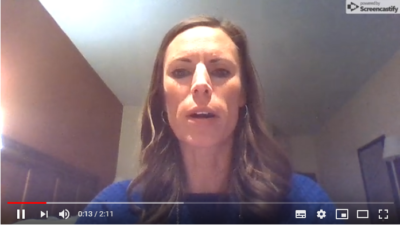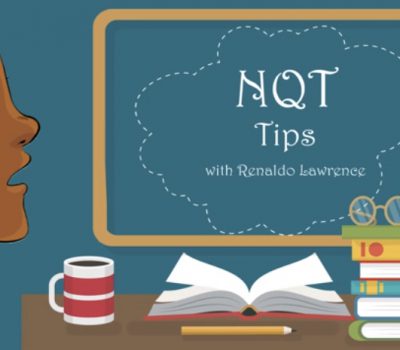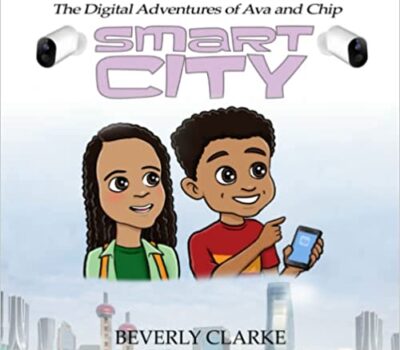


Our team sorts through all blog submissions to place them in the categories they fit the most - meaning it's never been simpler to gain advice and new knowledge for topics most important for you. This is why we have created this straight-forward guide to help you navigate our system.


And there you have it! Now your collection of blogs are catered to your chosen topics and are ready for you to explore. Plus, if you frequently return to the same categories you can bookmark your current URL and we will save your choices on return. Happy Reading!
Right now, teachers all over the world are making/grading/creating tests for their students. I have quit all that foolishness. I have not abandoned testing in my classroom. Instead, I have become more student centered and have given my students the responsibility of creating their tests…in particular, our final exams.

As many of you know, creating test questions can be quite difficult. It is hard to get the right text with the right meaning with the right answers. In particular, it can be hard to make great multiple-choice questions (I love them…but that is for another post) because you have to come up with plausible answers for all the choices. So, I told my kids they were responsible for creating the test questions.
Before I let them dive in and start creating questions, we spent time (around 5 months) learning how to write questions. See, whether you know it or not, creating questions from content is not something you just throw together. Questions have to be created using diction and syntax that allow for easy comprehension. The words you chose and the order you write them can dramatically change the content and context of the correct answer. With all this in mind, every week during class, we would focus on creating 1 or 2 questions regarding something we were working on. As I teach high school, we focused on interpretive questions as they require the reader to use contextual skills as well as inferences, predictions, and foreshadowing.
One of the things I told my students was that in order to write an interpretive question, simply start with the question stem HOW or WHY. These two words create an automatic need for the reader to search and create connections within parts of the text. It ALSO forces the question creator to do the same thing. After the first week of creating questions, some of my kids told me they confused, but they were confused because they could not find good ‘wrong’ answers that seemed plausible. I told them “that is the reason we are doing this :-)”
Anyway, we continued creating interpretive style questions for the rest of that school year. During the month of April, I told them they were going to create my 150 question final. I told them that for every one of their questions I used (I put the student’s name next to each question so the other students know who created the brain-burning question), I would give them 2 extra points on their final exam grade.
I told them they I would pick 150 questions that I thought were thought provoking and proved to be representative of what we had covered throughout the semester. At first, they thought I was joking. Nope. I gave them the power to create the test they would be tested on. I told them they could use all their study guides, phones, anything they wanted to help write the questions… and…they worked all period. They gave their questions to friends to see if they could answer them. They let me know if they had stumped their friend. One of the partnerships even came up to me and asked if a particular question was written ‘clear’ or if the question was worded wrong In essence, students were engaged in their own learning and were studying the material by trying to stump their friends.
One of my kids said out loud that, “I hope to God I do not get my own question wrong.” The students now value the assessment because they created it. After we take the assessment, each student will grade their own (again, another post for a different day).
If you want kids to value your tests, quit making them ‘your’ tests. Make the kids create them; you will be surprised at what they will create when they know they are given the chance and responsibility.

The author

Read more

Read more

Read more

Read more

Read more

Read more

Read more

Read more


Are you looking for solutions? Let us help fund them! Nexus Education is a community of over 11,000 schools that come together to share best practise, ideas and CPD via online channels and free to attend events. Nexus also offers funding to all school groups in the UK via nexus-education.com


Established in 2011, One Education is a company at the heart of the education world, supporting over 600 schools and academies. Our unique appeal as a provider is in the breadth and synergy of the services we offer, supporting school leaders, teachers and support staff to achieve the best possible outcomes for their pupils and staff.

School Space is a social enterprise that has empowered schools for over 12 years through their profitable and hassle-free lettings services. So far, they’ve generated over £5 million in revenue for education, helping to connect over 200 schools with their local communities.


Unify is an online sales and marketing tool that allows users to create tailored personalised documents in moments.


There’s nothing special about the energy we sell. In fact, it’s exactly the same energy as all our competitors provide. But there is something special about the way we do it. Where others complicate the process, we simplify it. Where others confuse customers with hidden terms, we’re an open book. And where others do all they can to make as much money from their customers as possible, we do all we can to make as little. Everything we do, we do it differently. Our customers are a privilege. One we’ll never take advantage of.


Securus provide market-leading monitoring solutions to safeguard students on ALL devices both online and offline. We also offer a full monitoring service, where we carry out the monitoring on behalf of the school, freeing up valuable staff resources. From the smallest school to large MAT groups, Securus offers safeguarding protection for all!


Bodet Time offers dedicated solutions to education through lockdown alerts, class change systems, PA and synchronised clock systems. Improving time efficiency of the working and school day; ensuring safety through lockdown alerts; increasing communication with customised broadcast alerts.


Robotical makes Marty the Robot - a walking, dancing coding robot that makes programming fun and engaging for learners as young as 5. Our robots come with a full Learning Platform that has complete teaching resources, to make lesson planning a breeze.